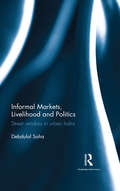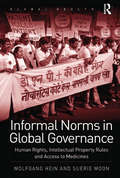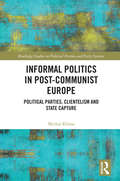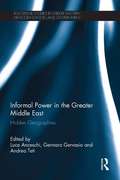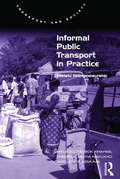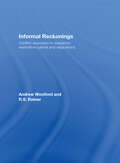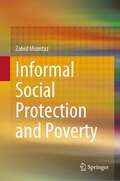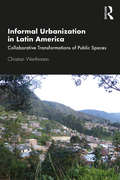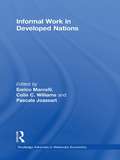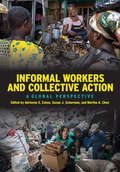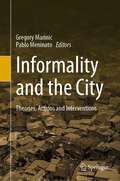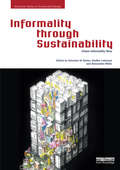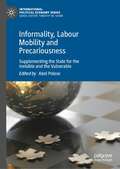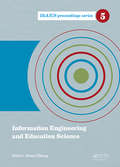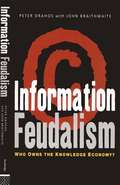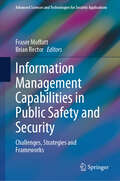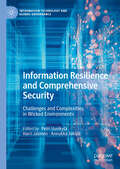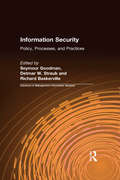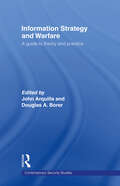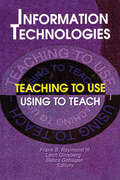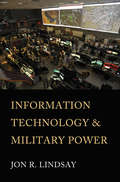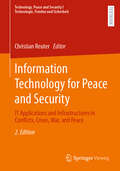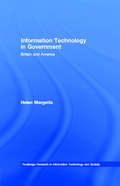- Table View
- List View
Informal Markets, Livelihood and Politics: Street vendors in urban India
by Debdulal SahaLow industrial growth, declining agricultural sector and limited expansion of formal sector employment in India have increasingly forced the poor to take recourse to informal sources of livelihoods. Street vending is one such thriving source of self-employment across cities. This book delves into the sustenance and survival strategies of street vendors across 17 cities in India and assesses the issues revolving around self-created markets, livelihood and politics that are contested in public space. It also presents a conceptual and theoretical understanding of different socio-economic and policy concerns pertaining to street vending in the country. The study shows how despite the absence of legal frameworks and institutional support, these urban self-employed informal workers subsist by arranging ad-hoc alternatives, creating informal institutions and negotiating with formal and informal actors in the market. It also discusses the Street Vendors (Protection of Livelihood and Regulation of Street Vending) Act, 2014, and examines how inclusive the legal recognition is for these workers of informal economy. Drawing on exhaustive research and a wealth of primary data, this book will be useful to scholars and researchers in development studies, labour studies, economics, sociology and those in public policy and urban planning.
Informal Norms in Global Governance: Human Rights, Intellectual Property Rules and Access to Medicines (Global Health)
by Wolfgang Hein Suerie MoonHein and Moon take up a serious problem of contemporary global governance: what can be done when international trade rules prevent the realization of basic human rights? Starting in the 1990s, intellectual property obligations in trade agreements required many developing countries to begin granting medicines patents, which often rendered lifesaving drugs unaffordable. At stake was the question of what priority would be given to health-particularly of some of the world’s poorest people-and what priority to economic interests, particularly those of the most powerful states and firms. This book recounts the remarkable story of the access to medicines movement. The authors offer an explanation for how the informal, but powerful norm that every person should have access to essential medicines emerged after a decade of heated political contestation and against long odds. They also explore the stability and scope of the norm. Finally, the book examines the limitations of informal norms for protecting human rights, and when renewed focus on changing formal norms is warranted.
Informal Order and the State in Afghanistan
by Jennifer Brick MurtazashviliDespite vast efforts to build the state, profound political order in rural Afghanistan is maintained by self-governing, customary organizations. Informal Order and the State in Afghanistan explores the rules governing these organizations to explain why they can provide public goods. Instead of withering during decades of conflict, customary authority adapted to become more responsive and deliberative. Drawing on hundreds of interviews and observations from dozens of villages across Afghanistan, and statistical analysis of nationally representative surveys, Jennifer Murtazashvili demonstrates that such authority enhances citizen support for democracy, enabling the rule of law by providing citizens with a bulwark of defence against predatory state officials. Contrary to conventional wisdom, it shows that 'traditional' order does not impede the development of the state because even the most independent minded communities see a need for a central government - but question its effectiveness when it attempts to rule them directly and without substantive consultation.
Informal Politics in Post-Communist Europe: Political Parties, Clientelism and State Capture (Routledge Studies on Political Parties and Party Systems)
by Michal KlímaThis book offers a fascinating, thought-provoking and ground-breaking study of post-communist political life. It is published just as the countries of Central and Eastern Europe mark thirty years since gaining freedom and have embarked on the path of democracy. This book is one of the first full-length academic works to explore the question of how informal structures, headed by bosses, godfathers and oligarchs, affect formal party politics and democracy. The unique post-communist transition is observed as a specific historical moment of disorder, offering a window of opportunity for the large-scale exploitation of public resources in the sense of a kind of "Klondike Gold Rush." Phenomena of corruption, clientelism, patronage, party capture and state capture are topical themes that are deeply explored. This text will be of key interest to scholars and students of Central and Eastern European politics, democratisation, transitional societies, clientelism, party systems and more broadly of comparative and European politics.
Informal Power in the Greater Middle East: Hidden Geographies (Routledge Studies in Middle Eastern Democratization and Government)
by Andrea Teti Luca Anceschi Gennaro GervasioOver the last decade or so, academic and non-academic observers have focussed mainly, if not exclusively on the institutions and places of formal power in the Greater Middle East, depicting politics in the region as a small area limited to local authoritarian rulers. In contrast, this book aims to explore the ‘hidden geographies’ of power, i.e. the political dynamics developing inside, in parallel to, and beyond institutional forums; arguing that these hidden geographies play a crucial role, both in support of and in opposition to official power. By observing less frequented spaces of power, co-option, and negotiation, and particularly by focusing on the interplay between formal and informal power, this interdisciplinary collection provides new insights in the study of the intersection between policy-making and practical political dynamics in the Greater Middle East. Contributing a fresh perspective to a much-discussed topic, Informal Power in the Greater Middle East will be an invaluable resource for students, scholars and those interested in the politics of the region.
Informal Public Transport in Practice: Matatu Entrepreneurship (Transport And Society Ser.)
by Meleckidzedeck Khayesi Fredrick Muyia NafukhoTransport discourse often concentrates on what is missing from transport policy and practice in developing countries vis-Ã -vis high-income countries rather than articulating local creativity in responding to transport needs as revealed in informal public transport modes such as matatu, motorcycle, bicycle and animal transport. This book helps to correct some of the tendency of inadequate contextualization of knowledge, technology and practice learning and transfer from one setting to another in transport and other development programmes. While countries such as Kenya have ambitions to develop their transport systems to fit into the globalized transport system, they also need to plan transport for ordinary life in both urban and rural areas. The matatu service, provided by privately-owned transport carriers, can be seen as a mirror of the life of Kenya, revealing how indigenous African entrepreneurship and capitalism straddles various economic, political and social systems. This book offers a phenomenological and situated analysis of the matatu entrepreneurship in the political economy of Kenya and its embeddedness in society. By adopting a social science approach, this book highlights a number of political, social and practical issues to demonstrate the matatu is not a decontextualized, disembodied and lifeless piece of moving metal carrying people and goods but rather part of a self-organizing industry, with its own logic of practice. This book is dedicated to Ajanga Khayesi.
Informal Reckonings: Conflict Resolution in Mediation, Restorative Justice, and Reparations
by Andrew Woolford R.S. RatnerThe 'reparational turn' in the field of law has resulted in the increased use of so-called 'informal' approaches to conflict resolution, including primarily the three mechanisms considered in this book: mediation, restorative justice and reparations. While proponents of these mechanisms have acclaimed their communicative and democratic promise, critics have charged that mediation, restorative justice and reparations all potentially serve as means for encouraging citizens to internalize and mimic the rationalities of governance. Indeed, the critics suggest that informal justice's supposed oppositional relationship to formal justice is, at base, a mutually reinforcing one, in which each system relies on the other for its effective operation, rather than the two being locked in a struggle for dominance. This book contributes to the discussion of the confluence of informal and formal justice by providing a clearer picture of the justice 'field' through the notion of the 'informal/formal justice complex.' This term, adapted from Garland and Sparks (2000), describes a cultural formation in which adversarial/punitive and conciliatory/restorative justice forms coexist in relative harmony despite their apparent contradictions. Situating this complex within the context of neoliberalism, this book identifies the points of rupture in the informal/formal justice complex to pinpoint how and where a truly alternative and 'transformative' justice (i.e. a justice that challenges and counters the hegemony of formal legal practices, opening the field of law to a broader array of actors and ideas) might be established through the tools of mediation, restorative justice and reparations.
Informal Social Protection and Poverty
by Zahid MumtazThis book analyzes the importance of informal social protection provided by religious institutions such as madrassas in a low-income country such as Pakistan. This book explains that Madrassas are religious schools that have existed in many Muslim countries for centuries and contributed significantly to preserving, forming, and extending human knowledge in medieval times. Further, madrassas are now more commonly viewed as the providers of a narrow education, supporting religious fundamentalism, that may lead to terrorism. However, this book asserts that education is not the only function performed by madrassas. They are a significant source of welfare support for the vulnerable and marginalized households in many low-income countries. This book helps the readers to understand the concept of informal social protection not conceptualized previously. In addition, its various attributes and institutions providing such a form of welfare worldwide are explained in detail; analyzing the usefulness of such a form of social protection would benefit readers of social policy, national governments, and international donor/aid agencies. This book also provides a prescriptive framework for integrating formal and informal social protection. This book provides a new "Multiple Regime Framework", for identifying various regimes in one country at one point in time by applying a novel data collection and analysis methodology. The application of this framework would be of particular interest to social policy scholars, national governments, and donor/aid agencies because it will result in better targeting of social protection policies in the wake of fiscal constraints. Lastly, this book provides a novel data collection and analysis strategy that will benefit the reader of research methodology, development consultants, donor agencies, and policy practitioners interested in using artificial intelligence to make informed and targeted policy decisions.
Informal Urbanization in Latin America: Collaborative Transformations of Public Spaces
by Christian WerthmannVarious kinds of informal and extra-legal settlements—commonly called shantytowns, favelas, or barrios—are the prevailing type of urban land use in much of the developing world. United Nations estimates suggest that there are close to 900 million people living in squatter communities worldwide, with the number expected to increase in the coming decades. Informal Urbanization in Latin America investigates prevailing strategies for addressing informal settlements, which started to shift away from large-scale slum clearance to on-site upgrading in Latin America over the last 40 years, by improving public spaces, infrastructure and facilities. The cases in this book range from one micro intervention (the Villa Tranquila Project in Buenos Aires) to three large-scale government-run projects: the celebrated Favela Bairro Program in Rio de Janeiro, the social housing program in São Paulo and the famous Proyectos Urbanos Integrales Approach in Medellín. The cases show a collaborative and sensitive transformation of landscape and public space, and provide designers and planners with the tools to develop better strategies that can mitigate the volatility that the residents of non-formal neighborhoods are exposed to. The book is a must-read for all who are interested or working in the global urbanization as well as social equity.
Informal Work in Developed Nations (Routledge Advances in Heterodox Economics)
by Colin C. Williams Enrico Marcelli Pascale JoassartAlmost everyone residing in a developed nation knows someone who has engaged in paid work that is licit but not reported to the government (e.g., babysitting, gardening, construction, financial consulting). But while most acknowledge that such work is helpful to the individuals involved, and that informal work may enhance a sense of community, most scholars view it as a pre-modern form of exchange and something that disappears as capitalist markets expand globally. Both mainstream and heterodox economics typically assume that there is an inevitable shift towards the formalization of goods and services provisioning as societies become more "advanced" or "developed" (the "formalization thesis"). In these views, the existence of informal activities is a manifestation of backwardness and it is assumed that they will disappear as an economy becomes more "modern." This book challenges these conventional theses about the linear trajectory of informal work and economic development by arguing that informal work is not trivial for understanding modern capitalist economies, and that both mainstream and heterodox theories about the economy must be altered to address the role of informal work in relatively developed economies. This edited collection focuses on informal work in various developed nations, including Canada, the United States, and several in Europe. It will therefore be of interest to policymakers, as well as students and researchers in development studies, social policy, sociology, anthropology, public health, geography, economics and planning. Enrico Marcelli is Assistant Professor of Sociology at San Diego State University, USA. Colin C. Williams is Professor of Public Policy at the University of Sheffield, UK. Pascale Joassart is Assistant Professor of Geography at San Diego State University, USA.
Informal Workers and Collective Action: A Global Perspective
Informal Workers and Collective Action features nine cases of collective action to improve the status and working conditions of informal workers. Adrienne E. Eaton, Susan J. Schurman, and Martha A. Chen set the stage by defining informal work and describing the types of organizations that represent the interests of informal workers and the lessons that may be learned from the examples presented in the book. Cases from a diverse set of countries—Brazil, Cambodia, Colombia, the Dominican Republic, Georgia, Liberia, South Africa, Tunisia, and Uruguay—focus on two broad types of informal workers: "waged" workers, including port workers, beer promoters, hospitality and retail workers, domestic workers, low-skilled public sector workers, and construction workers; and self-employed workers, including street vendors, waste recyclers, and minibus drivers.These cases demonstrate that workers and labor organizations around the world are rediscovering the lessons of early labor organizers on how to aggregate individuals' sense of injustice into forms of collective action that achieve a level of power that can yield important changes in their work and lives. Informal Workers and Collective Action makes a strong argument that informal workers, their organizations, and their campaigns represent the leading edge of the most significant change in the global labor movement in more than a century.ContributorsGocha Aleksandria, Georgian Trade Union ConfederationMartha A. Chen, Harvard University and WIEGO Sonia Maria Dias, WIEGO and Federal University of Minas Gerais, BrazilAdrienne E. Eaton, Rutgers, the State University of New JerseyMary Evans, Rutgers, the State University of New JerseyJanice Fine, Rutgers, the State University of New JerseyMary Goldsmith, Universidad Autónoma Metropolitana-XochimilcoDaniel Hawkins, National Trade Union School of ColombiaElza Jgerenaia, Labor and Employment Policy Department for the Ministry of Labour, Health and Social Affairs, Republic of GeorgiaStephen J. King, Georgetown UniversityAllison J. Petrozziello, UN Women and the Center for Migration Observation and Social DevelopmentPewee Reed, Ministry of Commerce and Industry, Republic of LiberiaSahra Ryklief, International Federation of Workers' Education AssociationsSusan J. Schurman, Rutgers, the State University of New JerseyVera Alice Cardoso Silva, Federal University of Minas Gerais, BrazilMilton Weeks, Devin Corporation
Informality and the City: Theories, Actions and Interventions
by Gregory Marinic Pablo MeninatoThis book advances the agenda of informality as a transnational phenomenon, recognizing that contemporary urban and regional challenges need to be addressed at both local and global levels. This project may be considered a call for action. Its urgency derives from the impact of the pandemic combined with the effects of climate change in informal settlements around the world. While the notion of “the informal” is usually associated with the analysis and interventions in informal settlements, this book expands the concept of informality to acknowledge its interdisciplinary parameters.The book is geographically organized into five sections. The first part provides a conceptual overview of the notion of “the informal,” serving as an introduction and reflection on the subject. The following sections are dedicated to the principal regions of the Global South—Latin America, US–Mexico Borderlands, Asia, and Africa—while considering the interconnections and correspondences between urbanism in the Global South and the Global North.This book offers a critical introduction to groundbreaking theories and design practices of informality in the built environment. It provides essential reading for scholars, professionals, and students in urban studies, architecture, city planning, urban geography, sociology, anthropology, cultural studies, economics, and the arts. As a critical survey of informality, the book examines history, theory, and production across a range of informal practices and phenomena in urbanism, architecture, activism, and participatory design. Authored by a diverse and international cohort of leading educators, theorists, and practitioners, 45 chapters refine and expand the discourse surrounding informal cities.
Informality through Sustainability: Urban Informality Now (Earthscan Series On Sustainable Design Ser.)
by Steffen Lehmann Alessandro Melis Antonino Di RaimoInformality through Sustainability explores the phenomenon of informality within urban settlements and aims to unravel the subtle links between informal settlements and sustainability. Penetrating its global profile and considering urban informality through an understanding of local implications, the authors collectively reveal specific correlations between sites and their local inhabitants. The book opposes simplistic calls to legalise informal settlements or to view them as ‘problems’ to be solved. It comes at a time when common notions of ‘informality’ are being increasingly challenged. In 25 chapters, the book presents contributions from well-known scholars and practitioners whose theoretical or practical work addresses informality and sustainability at various levels, from city planning and urban design to public space and architectural education. Whilst previous studies on informal settlements have mainly focused on cases in developing countries, approaching the topic through social, cultural and material dimensions, the book explores the concept across a range of contexts, including former Communist countries and those in the so-called Global North. Contributions also explore understandings of informality at various scalar levels – region, precinct, neighbourhood and individual building. Thus, this work helps reposition informality as a relational concept at various scales of urbanisation. This book will be of great benefit to planners, architects, researchers and policymakers interested in the interplay between informality and sustainability.
Informality, Labour Mobility and Precariousness: Supplementing the State for the Invisible and the Vulnerable (International Political Economy Series)
by Abel PoleseFrom the erosion of state legitimacy in Lebanon to the use of smartphones in Kyrgyzstan, from a Polish suburb to the music scene in Azerbaijan, this volume attempts to explain why, in a variety of world regions, a substantial number of people tend to ignore or act against state rules. We propose to look at informality beyond simplistic associations of the phenomenon with a single category such as "informal labour" or "corruption". By doing this, we propose to look for a correlation between the emergence, and persistence, of some informal practices and the quality of governance in a given area. We also suggest that a better understanding of the variety of informal practices present in a region can help conceptualising more adequate interventions and eventually improve the socio-economic conditions of its inhabitants.
Information Engineering and Education Science: Proceedings of the International Conference on Information Engineering and Education Science (ICIEES 2014), Tianjin, China, 12-13 June, 2014 (IRAICS Proceedings)
by Dawei ZhengThis proceedings volume contains selected papers presented at the 2014 International Conference on Information Engineering and Education Science (ICIEES 2014), held June 12-13 in Hong Kong, China. The objective of ICIEES 2014 was to provide a platform for researchers, engineers, academics as well as industry professionals from all over the world to
Information Feudalism: Who Owns the Knowledge Economy
by Peter Drahos John BraithwaiteNew intellectual property regimes are entrenching new inequalities. Access to information is fundamental to the exercise of human rights and marketplace competition, but patents are being used to lock up vital educational, software, genetic and other information, creating a global property order dominated by a multinational elite. How did intellectual property rules become part of the World Trade Organization's free trade agreements? How have these rules changed the knowledge game for international business? What are the consequences for the ownership of biotechnology and digital technology, and for all those who have to pay for what was once shared information? Based on extensive interviews with key players, this book tells the story of these profound transformations in information ownership. The authors argue that in the globalized information society, the rich have found new ways to rob the poor, and shows how intellectual property rights can be more democratically defined.
Information Management Capabilities in Public Safety and Security: Challenges, Strategies and Frameworks (Advanced Sciences and Technologies for Security Applications)
by Fraser Moffatt Brian RectorThis book provides thoughtful and extensively researched perspectives, to improve understanding of risks and rewards, and to outline strategies for developing and implementing mature information management capabilities focused on core public safety and security outcomes. Decision makers in Canadian public safety and security organizationslaw enforcement, fire and paramedic services, emergency management and national security, from local to national scopes and scales—are faced with an onslaught of rapidly changing technologies with uncertain application in an increasingly complex safety and security. How do these technologies fit into a strategic information management capability for public safety and security organizations? How do these technologies impact other areas of the organization? How can we harness these technologies to improve safety and security outcomes for Canadians? How would information governance strategy, governance and resourcing need to be structured and how would this function in the current operating environment and how would ethics, standards, privacy and information sharing and protection mechanisms need to be addressed in the face of compliance with legislation, regulation or policy? This volume makes the case for adopting strategic IM mindsets and practices intended to address a range of persistent IM challenges in public safety and security such as: building mature analytics and information sharing capabilities; building ethics, privacy, security and standards into IM governance aligned with public safety and security outcomes. The book is intended for senior decision makers in organizations that have responsibilities to delivery on core public safety and security outcomes and rely on information management to do so. These decision-makers face rapidly changing technologies in an increasingly complex business environment, face pressures for talent management and face risk-laden practices that impede or constrain the optimal use of information to achieve these outcomes for their organizations.
Information Politics, Protests, and Human Rights in the Digital Age
by Mahmood MonshipouriWe live in a highly complex and evolving world that requires a fuller and deeper understanding of how modern technological tools, ideas, practices, and institutions interact, and how different societies adjust themselves to emerging realities of the digital age. This book conveys such issues with a fresh perspective and in a systematic and coherent way. While many studies have explained in depth the change in the aftermath of the unrests and uprisings throughout the world, they rarely mentioned the need for constructing new human rights norms and standards. This edited collection provides a balanced conceptual framework to demonstrate not only the power of autonomous communication networks but also their limits and the increasing setbacks they encounter in different contexts.
Information Resilience and Comprehensive Security: Challenges and Complexities in Wicked Environments (Information Technology and Global Governance)
by Petri Uusikylä Harri Jalonen Annukka JokipiiChanges in the global environment, the complexity of decision-making, and the new role of social media have challenged the operating models and practices of traditional crisis preparedness and security of supply. In a knowledge society context, securing the continuous flow of information and communication on different platforms is a huge challenge, and the role of information resilience is more crucial than ever. Bringing together leading specialists from many fields on information resilience, this book examines how to ensure the undisturbed flow of information, the functionality of information and communications networks, and reliable and secure information content in all circumstances, both from an individual and societal viewpoint. The book address issues around information resilience from the standpoint of management, national security, misinformation, social media, and commercial actors. It will appeal to scholars and students of public policy, disaster management, security studies and governance, as well as practitioners.
Information Security: Policy, Processes, and Practices (Advances In Management Information Systems Ser. #42)
by Richard Baskerville Seymour Goodman Detmar W. StraubInformation security is everyone's concern. The way we live is underwritten by information system infrastructures, most notably the Internet. The functioning of our business organizations, the management of our supply chains, and the operation of our governments depend on the secure flow of information. In an organizational environment information security is a never-ending process of protecting information and the systems that produce it.This volume in the "Advances in Management Information Systems" series covers the managerial landscape of information security. It deals with how organizations and nations organize their information security policies and efforts. The book covers how to strategize and implement security with a special focus on emerging technologies. It highlights the wealth of security technologies, and also indicates that the problem is not a lack of technology but rather its intelligent application.
Information Strategy and Warfare: A Guide to Theory and Practice
by John Arquilla Douglas A. BorerThis volume develops information strategy as a construct equal in importance to military strategy as an influential tool of statecraft.John Arquilla and Douglas A. Borer explore three principal themes:the rise of theinformation domain and information strategy as an equal partner alongside traditional military strategythe need to consider the org
Information Technologies: Teaching to Use—Using to Teach
by Leon Ginsberg Frank B Raymond Iii Debra GohaganThis insightful volume explores examples of the use of technology to teach social work knowledge, values, and skills across the curriculum. The chapters cover a wide range of perspectives, including international views of the role of information technology in Great Britain and Malaysia, training approaches for faculty development, and computer-based software that has the potential to transform the manner in which curriculum objectives are met. Prepare for technology-based instruction in social work education for the 21st century!Information Technologies: Teaching to Use--Using to Teach Information Technologies: Teaching to Use--Using to Teach, addresses your need to fully prepare today?s social work graduates to work and live in this rapidly changing, technology-enhanced environment. Based on the 1997 Information Technologies Conference: Using to Teach--Teaching to Use, held in Charleston, South Carolina, this book covers the multitude of topics that were presented on technology-based instruction as we head into the 21st century. Articles in Information Technologies range from the use of the Internet and computer applications to research projects that address the effectiveness of technology-based teaching and learning activities. It also dicusses international views on the role of information technology in Britian and Malaysia. Information Technologies gives particular attention to distance education, and it is the most thorough treatment to date of the use and teaching of technology in social work education. Specific areas you?ll gain valuable information from include:establishing a faculty development labstarting intensive faculty training sessionscomputer-based software that has the potential to transform the manner in which curriculum objectives are metinternational perspectives on information technologythe use of Geographic Information Systems technology in social work practice as a tool for improved visualization of social and economic inequalitiesmodels for teaching social work curriculum with technologyWith Information Technologies, you will gain a competetive edge in preparing your faculty and students with the latest world-wide information on studies pretaining to technology use in a social work setting. A conglomeration of diverse and well-researched articles on the use of technology to enhance social work education await you in this special volume.
Information Technology and Military Power (Cornell Studies in Security Affairs)
by Jon R. LindsayMilitaries with state-of-the-art information technology sometimes bog down in confusing conflicts. To understand why, it is important to understand the micro-foundations of military power in the information age, and this is exactly what Jon R. Lindsay's Information Technology and Military Power gives us. As Lindsay shows, digital systems now mediate almost every effort to gather, store, display, analyze, and communicate information in military organizations. He highlights how personnel now struggle with their own information systems as much as with the enemy.Throughout this foray into networked technology in military operations, we see how information practice—the ways in which practitioners use technology in actual operations—shapes the effectiveness of military performance. The quality of information practice depends on the interaction between strategic problems and organizational solutions. Information Technology and Military Power explores information practice through a series of detailed historical cases and ethnographic studies of military organizations at war. Lindsay explains why the US military, despite all its technological advantages, has struggled for so long in unconventional conflicts against weaker adversaries. This same perspective suggests that the US retains important advantages against advanced competitors like China that are less prepared to cope with the complexity of information systems in wartime. Lindsay argues convincingly that a better understanding of how personnel actually use technology can inform the design of command and control, improve the net assessment of military power, and promote reforms to improve military performance. Warfighting problems and technical solutions keep on changing, but information practice is always stuck in between.
Information Technology for Peace and Security: IT Applications and Infrastructures in Conflicts, Crises, War, and Peace (Technology, Peace and Security I Technologie, Frieden und Sicherheit)
by Christian ReuterTechnological and scientific progress, especially the rapid development in information technology (IT) and artificial intelligence (AI), plays a crucial role regarding questions of peace and security. This textbook, extended and updated in its second edition, addresses the significance, potential of IT, as well as the challenges it poses, with regard to peace and security. It introduces the reader to the concepts of peace, conflict, and security research, especially focusing on natural, technical and computer science perspectives. In the following sections, it sheds light on cyber conflicts, war and peace, cyber arms control, cyber attribution, infrastructures, artificial intelligence, as well ICT in peace and conflict.
Information Technology in Government: Britain and America (Routledge Research in Information Technology and Society #Vol. 2)
by Helen MargettsThis book situates information technology at the centre of public policy and management. IT is now a vital part of any government organisation, opening new policy windows and enabling a vast range of tasks to be carried out faster and more efficiently. But it has also introduced new problems and challenges. Four in-depth case studies demonstrate how information systems have become inextricably linked with the core tasks of governmental organisations. The key government departments examined are:* the Inland Revenue Service and Social Security Administration in the US* the Inland Revenue and Benefits Agency in the UK
